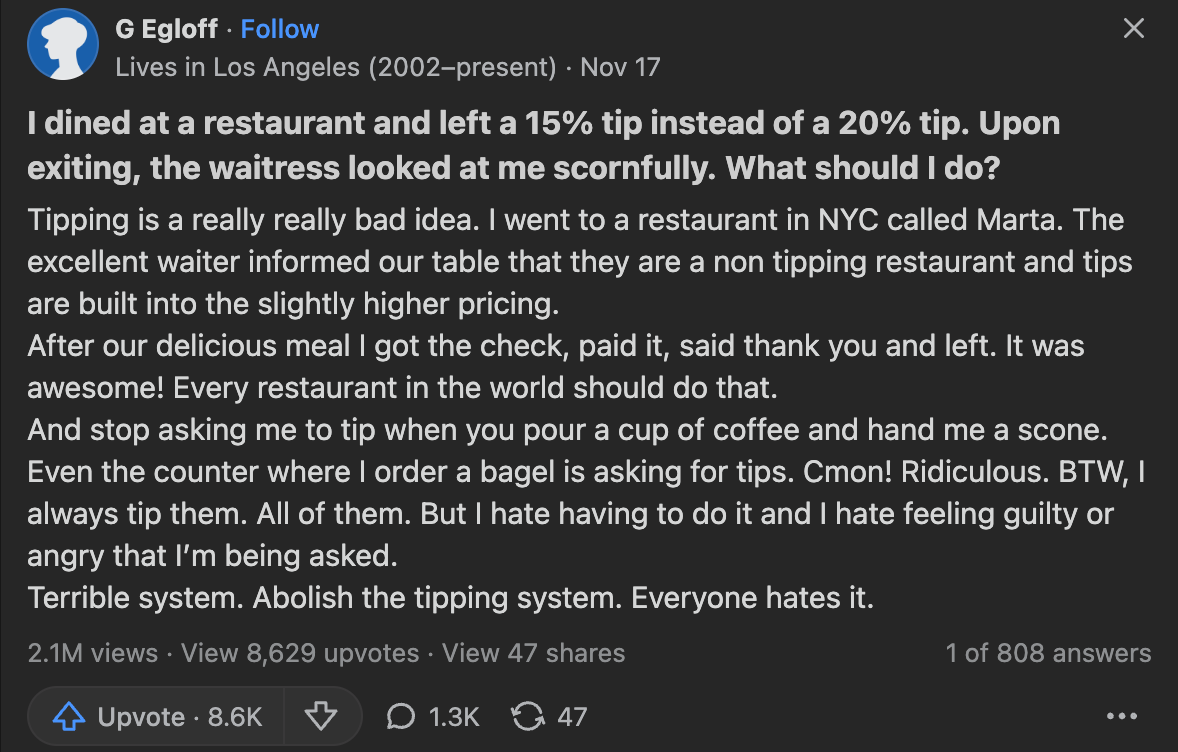To tip or not to tip?
A counter service worker's experiences with America's least favorite pastime
One of my favorite memories from my time as a college tour guide involves a tip. At that job, tipping was by no means customary. In fact, tips were something akin to a white whale or the Loch Ness monster; many told tall tales about them, but few had actual encounters with the legends
I counted myself a part of those masses, not quite sure whether I could believe in the myth. At least, that was the case until one day in the summer of 2021. It was a sunny summer day in Pittsburgh and I was wrapping up a tour smack-dab in the middle of the Schenley Quadrangle (Pittsburgh universities, for some reason, are obsessed with quadrangles). After an hour of sharing information, earning belly laughter from my audience, and even receiving some enticed looks from my prospective families, obviously stunned by my preternatural beauty, I saw one of the families approaching. Of course, they wanted to comment on how great my tour was. They were so impressed, in fact, that the patriarch reached out to shake my hand. While it was a bit unexpected and definitely unusual, I was flattered by the gesture.
“That’s just a little something to buy yourself a coffee later.” His wife said, her husband’s hand in mine.
Well, call me fucking Ishmael; it was happening!
I understood what the woman meant right before I felt it pressing against my palm. That texture that’s designed to feel not quite like anything else. There was a bill in my hand. But which historical figure of dubious morals would stare back at me once I unfurled the note? Only time would tell.
After thanking them, fighting the churlish urge to break into a skip, I started to walk away. I made it to Fifth Avenue, comfortably out of the family’s view and opened my palm to see how large a grin the gods above had smiled upon me.
Turns out, it was little more than a smirk; and one with wooden teeth (or the teeth of enslaved people, depending on whom you ask) at that. That’s right! Starting back at me was the pride of Mount Vernon, the Father of my country, and enemy to Cherry Trees everywhere: George Washington.
As was the case with many legends, tipping, at least my experience with it, proved itself to be on par with Dorothy finding the wizard behind the curtain or Geraldo Rivera unsealing Al Capone’s vault; ultimately, the reveal was much less exciting than it had been built up to be.
When I first became a tour guide, which was the first job for which I earned an hourly wage, I was paid eight dollars and seventy cents ($8.70) an hour. Despite the fact that I knew this was too little, it was, to echo the argument of my employer and even some of my coworkers, significantly more than Pennsylvania’s minimum wage as well as the federal minimum wage, both of which are still seven dollars and twenty-five cents ($7.25) an hour. To put that in perspective, I learned three different tours, made sure those tours were engaging and entertaining for my audience, and then led those tours while simultaneously herding dozens of people around a bustling urban area. On top of that, I was even tasked with doing a lot of behind the scenes work for the admissions department. Behind the scenes work could be anything from packing goodie bags and stuffing informational folders to setting up chairs, tables, and banners for admissions programming. All of that for $8.70 an hour.
Again, I knew my compensation did not reflect the amount of work I was putting into my job, and I basically told anyone who would listen. Whether it was coworkers in the corner of a party, or simply my mother on the phone, everyone knew that, despite loving the job, I was not happy with the amount of money I was making. Therefore, in the fall semester following that summer, when it was announced that the base wage would be raised to ten dollars ($10) per hour (still too little, by the way), I remember my friend Valerie turning to me and saying, “that was you, Quinn.” I was not too quick to take credit, I’m just telling you, dear readers, what some people were saying at the time.
It was also around this time that, considering those deeper reflections upon the money I was making in tandem with my budding interest in labor politics, I started tipping people whenever I had the chance. Instead of rolling my eyes when a tipping option came up on a Square, Toast, or Clover POS system, I started leaving tips. Before that, as the child of two parents who worked in restaurants, it had been instilled in me to always tip twenty percent to food servers and bartenders. However, being underpaid, myself, made me understand just how many other people around me, whether they were baristas or food prep workers, found themselves in a similar situation. Like me, there were countless workers doing all of this extra work but not being afforded a certain level of understanding concerning their underpayment.
I am not writing about my approach to tipping in order to reveal myself as a noble person or to get pats on the back. This is, in fact, the same newsletter wherein I published a 2000+ word essay outlining how my coworker is a miserable person; I am, in no way, holier than thou. To some extent, I even realize that my tipping philosophy is counterintuitive as someone who, ideally, would like to see tips become futile. While tipping is not, in concept alone, stupid, I do find it idiotic that we, as a society, have deemed it appropriate for entire professions to have their wages depend on the kindness of others. Additionally, the normalization of gratuity in the United States became even more unsavory as I looked deeper into its origins.
While tipping had a foothold in the US before this period, Reconstruction made the practice much more common. This is because many companies, most notably luxury train-liner The Pullman Company, made the decision to hire newly freed slaves, pay them paltry wages, and encourage their wealthy customers to tip them. In an excellent article on the history of tipping for Restaurant Business, Jonathan Maze writes that Pullman, “paid them miniscule wages, about $27.50 per month in 1916… That’s the equivalent of $814, which is less than the equivalent today of $10,000 per year, though they often worked 400 hours per month.”1 From this point on, tipping only became more standard. It was so rooted in US culture that, even after the Fair Labor and Standards Act established the first federal minimum wage of twenty-five cents ($0.25) an hour, Congress did not go as far as to establish a tipping minimum wage until 1966. Nowadays, while the federal minimum wage sits at an embarrassing $7.25, the federal tipped minimum wage is a downright immoral two dollars and thirteen cents ($2.13) an hour. On top of that, only seven states in the US mandate that tipped workers be paid a full minimum wage.2 Discussing the impacts of a full minimum wage for tipped workers, Rachel E. Greenspan, writing for Time, found, “The Economic Policy Institute, a nonprofit think tank, says that the poverty rate among restaurant workers is significantly lower (at only 7%, versus 18%) in states where restaurants are required to pay minimum wage as a base salary.”3
After looking into the history of tipping, my assumptions were confirmed. To say nothing of its racist origins, it, at the very least, remains a system exploited by business owners and the managerial class to cut their operation costs. Furthermore, it is my contention that, as gratuity becomes more normalized for counter service workers, like baristas, it has become a huge giveaway to those same business owners. Now, instead of offering higher, more competitive, even livable wages to their employees, they can simply buy a tip jar and call it a day. The US government, for their part, has also been derelict in their responsibility to mandate higher wages. The federal minimum wage has not been raised since July 24th, 20094, which was just a month or so after I finished the second grade. In the meantime, even progressive movements like Fight for Fifteen, which strives to raise the minimum wage to fifteen dollars ($15) per hour, feel as though they are becoming obsolete as the price of living continues to skyrocket.5
All of these conditions around the minimum wage create an interesting dilemma for someone like me who, knowing all of this, does not think that tipping has been a net good for US society. However, the reality is that tipping, for now, doesn’t seem to be going anywhere. Therefore, as a consumer myself, do I take the opportunity to directly put money into the pockets of workers? Do I sit out of the practice entirely in moral opposition? Do I come up with my own criteria for tipping and become stronger in my resolve? Or, do I pray vigorously that the money system finally falls and we can get back to the barter economy as the gods intended?
My view on tipping has also, of course, been informed by my own time as a tipped worker. This coincided with me starting my first wine retail job in May of last year. Luckily, while I did make tips, I also made a good hourly wage (albeit, competitive for the area), especially considering this job was, like my tour guide position, based in Pennsylvania. With that being said, my coworkers and I, who pooled all of our individual tips, always strived to maximize our gratuities. In part, this necessarily looked like learning the wine portfolio in order to better guide our customers’ retail and tasting experiences. However, it also looked like lifting pounds upon pounds of cases of wine so our shelves were stocked. Additionally, it looked like mopping the floors, cleaning the bathrooms, and polishing hundreds of glasses per day so our customers had a seamless visit. Some days, maximizing the tips even meant going out to the grass clearing behind our property and directing literal traffic so our customers had places to park (not to mention the wicked sunburn I got on my scalp for not wearing a hat).
All of this to say, there was a lot of work my coworkers and I completed before our first customer even set foot on property and after our final customer left for the night. It was this experience that made me resent sentiments like this one:
When I see sentiments like this posted to the Internet or even hear them in conversations with friends, as I did very recently, I find they exist as tells that that individual has never actually worked a service job. As I laid out above, even if I was assigned the retail counter at my job, I had done a lot of work before I “turned the iPad around.”
Now, these kinds of attitudes are much more prevalent when it comes to tipping counter service workers. However, they also exist in leaving gratuities for servers or bartenders. Take this post on Quora, a popular question and answer website, for an example:
Or even this screenshot from a Facebook post that went viral a couple of years ago:
I have also had unsavory interactions around tipping in person. A couple weeks ago, after hitting the wrong tipping option when they were checking out, a customer found it appropriate to tell me, “I just wanted to let you know, while I have nothing against you, I did not mean to leave you a twenty percent tip.” Another favorite memory of mine occurred right after I started that first wine retail job. I was bagging three bottles of wine that an elderly customer had bought and someone else, I’m assuming one of their children, asked, “it’s asking if you want to leave a tip,” to which the customer replied, quite loudly, “they ain’t did nothing!”
I share all of this not to judge these social media users or my real-life customers for the amount of gratuity they do or do not leave. Rather, as someone who finds themselves between the rock of working for tips and the hard place of opposing the existence of the practice, I’m simply trying to illustrate how weird people can act when prompted to leave a tip. This weirdness, in turn, creates an adversarial relationship between the consumer and the worker who, for the most part, does not make any of the decisions about how the business is run. Therefore, it is my contention that the anger of these consumers would be much more productive if it was directed at management and ownership teams who are increasingly choosing to offset their labor costs onto that consumer. What would be even more productive is if that angry consumer took their grievance to an elected representative and advocated for an increase in the minimum wage so that maybe we, as a society, could finally leave this inherently racist practice in the past where it belongs. At the very least, if that consumer does not want to use their anger in any of those constructive ways, then they can at least hit “no tip” (it’s there, I promise! In fact, most customers have no problem finding it) and move on with their day instead of being nasty to a person who, by making tips, is not only in all likelihood being underpaid but also has absolutely no control over the machine that prompts their customers to tip. I mean, let’s face it: if I knew how to code something like that into a POS system, I probably wouldn’t be asking people if they wanted a bag for their overpriced bottle of wine.
Ultimately, much to my chagrin, I do not believe tipping is going anywhere for the foreseeable. With that being said, consumers do still hold some power in the matter. Consumers can, of course, choose how much or how little gratuity they want to give those who serve them; but, more than that, they can also choose to take a step back, realize how little power tipped workers possesses, and, in turn, treat those same workers with the dignity and respect they deserve. Put another way, whether you choose to tip or not, please just be normal!
This week’s recommendations:
This episode of the Fear& podcast, featuring Jennifer and Angie from I’ve Had It, which echoes some of my thoughts on tipping starting around the 47:40 mark
Fake plants that are made from something else than plastic, like these knit ones I bought in Mexico:
Handmade art
“Together Again” by Janet Jackson
Maze, Jonathan. “In the U.S., Tipping Has a Controversial and Complex History.” Restaurant Business, 21 March 2023, Link.








